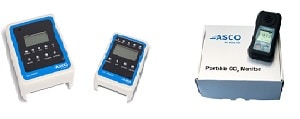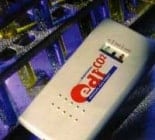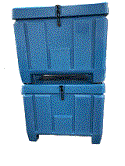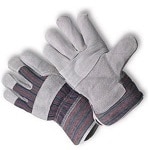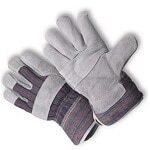 Safety Precautions for Dry Ice
Safety Precautions for Dry Ice
Dry ice safety is essential for all dry ice use. Make sure everyone understands the dangers of contact and the need for proper ventilation.
Caution: Always supervise children around the dry ice.
HANDLING
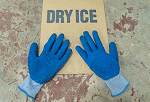 Dry ice temperature is frigid at -109° or -78°C. Always handle dry ice with care and wear protective gloves whenever touching it. It is harmless if touched briefly, but prolonged contact with the skin will freeze cells and cause injury like a burn.
Dry ice temperature is frigid at -109° or -78°C. Always handle dry ice with care and wear protective gloves whenever touching it. It is harmless if touched briefly, but prolonged contact with the skin will freeze cells and cause injury like a burn.
NECESSARY VENTILATION
Do not enter closed areas that have stored dry ice before airing out. Normal air is 78% Nitrogen, 21% Oxygen, and only 0.035% Carbon Dioxide. If the concentration of carbon dioxide in the air rises above 0.5%, Do not enter closed areas that have stored dry ice before airing out. Normal air is 78% Nitrogen, 21% Oxygen, and only 0.035% Carbon Dioxide. If the concentration of carbon dioxide in the air rises above 0.5%, CO2 can become dangerous.
PICK-UP TIME AND TRANSPORTING
Please pick up the dry ice when needed or have it delivered to your location. Depending on the insulation, it sublimes 10 to 15 pounds every 24 hours. If transported on a flatbed truck, make sure to protect it from rain, or you may look like a special effects vehicle with smoke-like fog pouring out behind you. One truck was stopped by the police when this happened.
BURN TREATMENT

Treat dry ice burns the same as heat burns. Otherwise, if only red, it will heal at the same rate as a regular burn. Apply antibiotic ointment to prevent infection and bandage when the damaged skin site needs to be protected. See a doctor if the skin blisters or peels off.
DRY ICE Beverages
 It is OK to put big chunks of dry ice into beverages for drinking as long as the dry ice is food grade. (CO2 used in the beverage industry.) It will carbonate the drink.
It is OK to put big chunks of dry ice into beverages for drinking as long as the dry ice is food grade. (CO2 used in the beverage industry.) It will carbonate the drink.
Do not swallow the dry ice pieces.
DRY ICE “Firecrackers”
 This injury came from holding the bottle when it ruptured! Luckily it missed both eyes!
This injury came from holding the bottle when it ruptured! Luckily it missed both eyes!
Small pieces of dry ice in an empty one-liter plastic soda bottle filled ¼ with hot water may explode sometime after the top is tightly screwed on. It also may crack and only fizzle. Wear gloves and eye protection because the explosion will shoot the bottle top and pieces of the plastic bottle. Please ensure no one is holding the bottle or near it when it bursts.
Some municipalities classify these dry ice “firecrackers” as dangerous “terrorist explosives” and outlaw them even though this eruption sprays only carbon dioxide and water. Therefore DO NOT DO THIS IF IT IS ILLEGAL IN YOUR COMMUNITY!
Using anything other than plastic bottles is even more dangerous, and it should never be allowed!
TOO MUCH CO2
Small concentrations of CO2 can cause quicker breathing, headaches, and drowsiness in some but are otherwise not harmful.
Danger! If dry ice has been left in a closed auto, van, room, or walk-in freezer for more than 15 minutes, open doors to allow adequate ventilation before entering. Exit all areas containing dry ice CO2 if you start hyperventilating, develop a headache, or your fingernails or lips start to turn blue. These are signs that you have too much CO2.
DISPOSAL
Unwrap and leave it at room temperature in a well-ventilated area. It will sublimate from a solid into a gas.
TILED SURFACES
Do not leave dry ice on tiled countertops or floors as the extreme cold could crack them.
FOR DRY ICE BLASTING
It may be best to wear protective face protection and, in confined spaces, wear a breathing apparatus supplying oxygen.
PROVIDE adequate ventilation.
Have additional ventilation for indoor projects and monitor yourself and others for shortness of breath or dizziness.
A CO2 monitor may be helpful.
Caution: Keep dry ice away from children or others who could take the dry ice. You may be liable for any injuries. Keep the working area well ventilated at all times.
STORAGE
Store dry ice in an insulated container. The thicker the insulation, the slower it will sublimate. Do not store dry ice in a completely airtight container. It may explode. Keep proper air ventilation wherever dry ice is stored. Suffocation can occur in too high a concentration. There are Commercial Storage Containers available for safe storage.
Bonar Plastics
MSDS
Here are two Material Safety Datasheets available online.
Airgas
Linde
DO NOT leave dry ice unattended where children or others could take it. You may be liable for injuries.
For more information, contact us.
Halloween Safety Print-out
You may add your dry ice business to our websites for new customer contacts.
Professional Companies Offering Assistance

